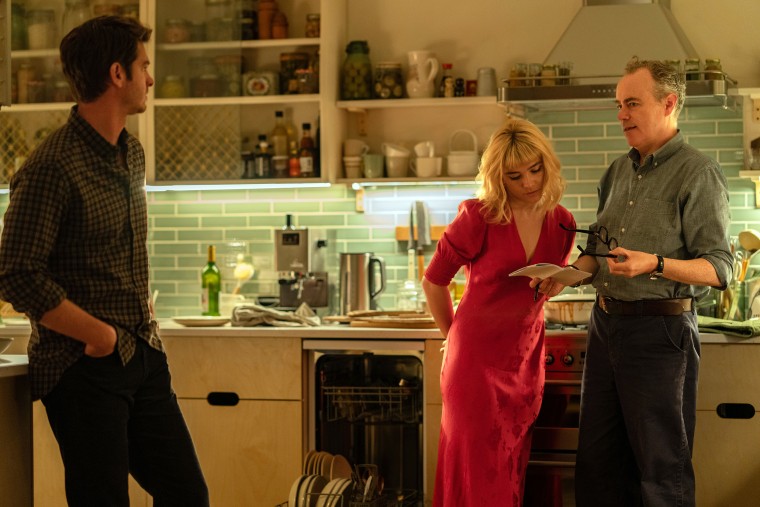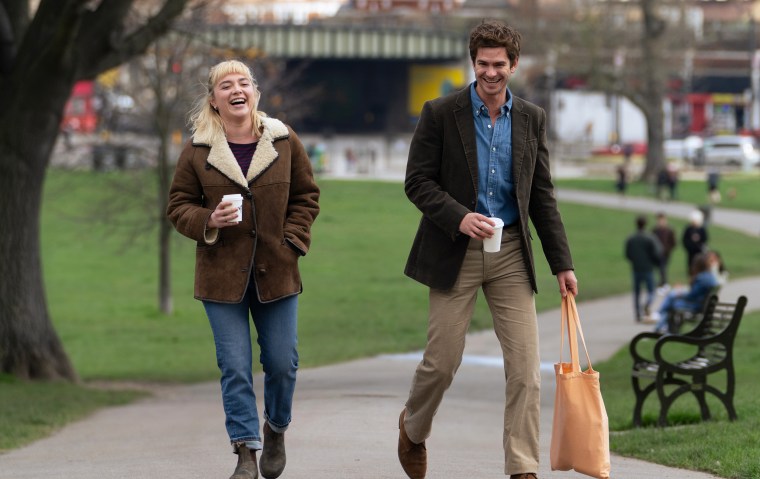'We Live in Time' Ending Explained By Director: Does Almut Die?
Warning: This article contains spoilers for “We Live in Time.”
“We Live in Time” wasn’t supposed to end like that.

The movie, which passes out tissues for people in the audience, has a gut-wrenching conclusion.
But the script for the romantic dramedy starring Andrew Garfield and Florence Pugh has a different ending than what viewers ended up seeing on screen, the film’s director John Crowley tells TODAY.com.
“One of the scenes that was meant to be the last scene of the film, we moved into the heart of film,” Crowley reveals.
“We Live in Time” follows Almut (Pugh), a chef and restaurant owner, and Tobias (Garfield), a very recently divorced Weetabix employee, as they meet in a chance encounter — when Almut accidently hits Tobias with her car.
Andrew Garfield and Florence Pugh work with director John Crowley while filming "We Live in Time."A24The couple’s love story is told out of order. It opens with Almut discussing with Tobias how they should move forward after her ovarian cancer diagnosis, then cuts between poignant moments in their relationship: Moving from friends to lovers, breaking up, deciding to try to have a child together, going through fertility treatments and living life with their daughter, Ella.
The film’s opening scene, suggesting the recurrence of Almut’s cancer, hangs over their love story. In the subtle final scene, it becomes that she has died, and Tobias and Ella are continuing on without her.
Crowley says the movie was a tear-jerker behind the scenes, too. His own crew cried while shooting multiple scenes of the film, in addition to what ended up becoming the conclusion.
“There were no shortage of tears and emotions flying on that set — plenty of mine,” Crowley says through laughter.

But the Irish director says that is precisely what drew him to the project.
“I loved the fact that the film was dealing with some of the most profound elements that happen in people’s lives every day, but when they happen to them, they’re irreducibly specific — like falling in love or having a child or getting ill,” Crowley says.
“What it was ultimately about was not a journey of decline toward somebody dying, but what it means for two people to try and meaningfully ask the question for themselves: What’s a good life in the face of this mortality that is foreshortening our time together?” he continues.
What was the original ending of ‘We Live in Time’?After spending eight weeks filming the movie, Crowley says he started with a “beautiful set of scenes” in the editing room.
In the film’s script, the last scene was of Almut walking into the apartment and announcing that she was in remission, Crowley explains. In the film, Almut is first diagnosed with cancer when she and Tobias are dating.
“You actually can come back to life in stories, and you can find the truth of what that means and find the expression of that,” Crowley says.A24“I was sure that that would really play at the end of the film. The idea behind that was that in life, death is irredeemable. It’s an absolute event that happens — game over,” Crowley says. “And in storytelling, it’s not. You actually can come back to life in stories, and you can find the truth of what that means and find the expression of that.”
As Crowley worked with his editing team, they started rearranging pieces of the film to better match the story they had created on set.

The ending of the film begins as the clock counts down at the Bocuse d’Or, an international chef championship that Almut entered without telling Tobias, who she knew wouldn't approve of her competing while undergoing chemotherapy.
After an explosive argument in which Almut tells Tobias she wants to be remembered for her vivaciousness and passion, and that she doesn’t want to wither away while she’s still living, he begins to understands her decision. And Tobias in the stands at the competition, cheering her on with their daughter.
As the dishes are plated and the timer hits zero, Almut leaves her workstation, gathers Tobias and Ella and walks out of the building without knowing the results.
The trio head over to an ice skating rink, where Almut effortlessly begins skating like she did in her youth, when she was an accomplished figure skater.
“That felt like the truest expression of losing somebody.”
John CrowleyAt one point, Almut breaks away from her family, looks over at them across the rink and waves toward them — a clear, but unspoken, goodbye.
"There’s something about the distance and the waving and that being the last gesture of the film, for that relationship, that felt awful in the best sense of the word,” Crowley says. “Which is it makes you lean forward and go, ‘You got to be kidding me. That’s not it. Surely she’s going to...’ and that felt like the truest expression of losing somebody.”
“That felt more truthful than seeing her again. Once she left the story, it suddenly felt like a lie to bring her back into it,” he continues. “Then that part of their story is over. The story that’s about to begin, which is a separate one, is Tobias and Ella, and their journey.”
The next scene, the movie's final one, is quiet. Tobias and Ella walk into the kitchen of their country house with a dog, a callback to Almut and Tobias's discussion about getting a dog to help prepare their daughter for her mother’s death.
"They’re sad and it’s heartbreaking, but they’re going to live — they’re going to live."
John Crowley
In the kitchen, Tobias shows Ella how to crack an egg the same way Almut once taught Tobias — meaning her legacy does live on, though her death is never directly addressed.
"We opened the film with (Pugh) in that same kitchen,” Crowley says. “That felt as complete and as eloquent a statement as was needed to suggest, now, well, these two are going to be great.”
He adds: “They’re sad and it’s heartbreaking, but they’re going to live — they’re going to live. They’re going to point you forward, and that’s where the story goes with that — it felt far more truthful.”
Anna Kaplan
Anna Kaplan is a news and trending reporter for TODAY.com.

















































